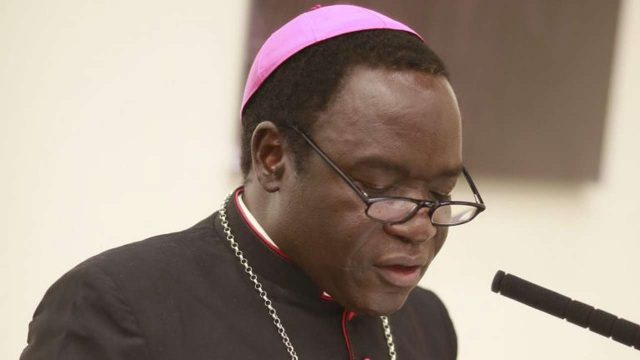Bishop of Sokoto Diocese, Matthew Hasan Kukah, has said though President Bola Tinubu said he is prepared to be Nigerian president, but he is still struggling.
He said all Nigerian presidents since independence were accidental leaders.
He said the past leaders, including former presidents Muhammadu Buhari, Goodluck Jonathan, Umaru Yar’adua, Olusegun Obasanjo, Ernest Shonekan, and Sani Abacha, were not prepared before they assumed power.
Despite Tinubu’s preparedness, Kukah said Nigerians were suffering under the current administration.
Kukah who spoke during the fourth Amaka Ndoma-Egba Memorial Lecture, with the theme, “Leaders of Tomorrow: Creating Lasting Change in A Complex World,” at the weekend in Abuja, lamented that Nigeria’s leadership crisis was due to the lack of knowledge, capacity, and preparedness of its leaders, who simply wanted to govern and enrich themselves and their cronies.
He said “I don’t want to bore you, but run through, from the beginning, you’ll find that almost everybody who came to power in Nigeria was as a result of one accident or the other.
He stated, “If we are to start from the beginning, you will find that almost every leader who came to power in Nigeria did so as a result of one accident or another. President Tinubu, who said he was prepared for the role, is struggling. We are still trying to get off the ground. He took over from Buhari, who had already given up.
“Buhari took over from Jonathan, who was thinking that after finishing being deputy governor, he would go somewhere else and then something happened. Jonathan took over from Yar’adua, who had actually said he was going to teach at Ahmadu Bello University as he was finishing his term as governor.
“Yar’adua took over from Obasanjo, who was in prison, and was not expecting to come out but he somehow found himself out of prison.
“Obasanjo took over from Abacha, who, sadly, even though the five political parties had said he would rule forever, nature took him.
“Abacha took over from Ernest Shonekan, who was busy at the United African Company of Nigeria, and then they told him to come and be head of state. We can go all the way down but fundamental to governance is knowledge.”
Kukah said the benefits of democracy went beyond physical infrastructure, adding that if democracy were solely about infrastructure, people would still be praising authoritarian regimes, like Adolf Hitler and apartheid South Africa, which he said built impressive infrastructure during their reigns.
“Democracy’s benefits are often not necessarily measurable. They are largely intangible. It is understanding how to expand the frontiers of human imagination,” he stated.
He said the culture of nepotism is widespread in the country, saying ministerial and other appointments are often based on personal relationships rather than , adding Nigerians were impatient with the current state of democracy in the country, which he said was hardly working.
Despite Nigeria’s little progress, Kukah said Nigerians were never satisfied, adding that the country will never be in a perfect place because such places do not exist.
“We have made a choice to live with democracy as it is, we know that our democracy is hardly working, hardly functioning, although I’d make quick to say that we are very impatient with ourselves, very, very impatient.
“Nigerians are surprised when I say we have done pretty well. We are absolutely not happy and we will probably never be happy, because that’s not how the world is. You’ve got this, you want this, you want that. We are insatiable.”
“Now, we are not in a perfect place, because perfect places don’t exist, and we shouldn’t be looking for leaders who will take us to a place of perfection, because nobody has found that kind of place.
“However, there are minimum conditions that we require in a leader, and I think we need to use them to measure the whole concept of leadership.”









